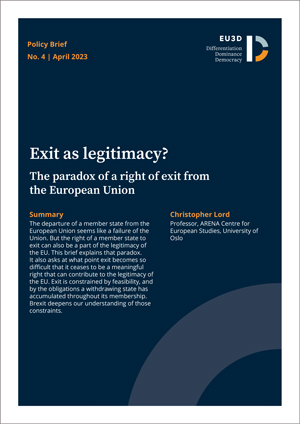The EU funded project EU Differentiation, Dominance and Democracy (EU3D) has studied when differentiation is politically acceptable, institutionally sustainable and democratically legitimate, and when it is not.
"The decision to focus on the interaction between EU differentiation (EU complexity), power relations (dominance) and democracy was fortuitous because these issues are perhaps even more relevant today than when the project started," says Professor John Erik Fossum, coordinator of EU3D.
The over four year long project was concluded in July 2023. It brought together ten partner institutions and around 50 researchers, as well as administrative project members, research assistants and master's students.
"Coordinating such a project is both a daunting challenge and a unique opportunity. We enjoyed very good collaboration across the project and also excellent research support. Both are vital conditions for project success," says Fossum.
Read more about Fossum's research in the project (in Norwegian).
Publications and policy advice
During the lifetime of the project, researchers in the project have published peer-reviewed articles, books and special journal issues. The researchers and invited guests have also published in EU3D's own series: reports, research papers, blog posts, policy briefs and insights from practitioners. 
All EU3D publications can be found here.
In the EU3D policy brief series, researchers highlight main findings and give recommendations to practitioners who may benefit from the knowledge gathered in the project.
Project members have also been in active conversation with policy makers and stakeholders through its policy dialogues. Project partners have held events in their respective countries, and project members have also gathered for European level policy dialogues.
In April 2022, EU3D was invited to organise the seminar ‘Democracy in Tomorrow’s Europe: Institutional debates, action and tools in the context of the Conference on the Future of Europe’ at the Jean Monnet House outside Paris. The event was organised in cooperation with the European Parliamentary Research Service (EPRS) and the European Parliament’s DG Communication.
Learn more about the event in Paris, in this video produced by Jean Monnet House:
The final European level policy dialogue was held in July 2023, organised by project partner Bruegel. It gathered EU3D researchers John Erik Fossum, Magdalena Góra and Sergio Fabbrini, who talked about parliamentary debates. Representatives from European level political parties joined in the discussion on 'Democratic Resilience in light of the 2024 EU elections'.
Videos summarising main findings
Jagiellonian University Krakow has taken the lead, in cooperation with ARENA, in producing a number of short videos about findings from the project. The videos feature John Erik Fossum and Martin Moland from ARENA, in addition to nine other project members from across Europe.
Watch a summary of the project as a whole in the first video, and a series of videos on four different topics below:
Constitutional models for the future European Union
In this video by the EU3D project, John Erik Fossum and Sergio Fabbrini explain their research on constitutional models for the EU.
Political actors' views on the future of the European Union
Magdalena Góra, Elodie Thevenin and Katarzyna Zielińska present their research within the EU3D project on how political actors in European and national parliaments debate and narrate the future of the EU.
Media narratives and European reforms
Researchers in the EU3D project, Martin Moland, ARENA Centre for European Studies, and Giuseppe Porcaro, Bruegel, explain their findings on media narratives and European reforms.
Public opinion on differentiated integration and the future of the EU
EU3D researchers Dirk Leuffen and Jozef Bátora discuss their findings on public opinion and thought communities in the EU.
The videos were produced in cooperation with EU3D partner Jagiellonian University, Krakow.
About the project
EU3D is an EU-funded international research project coordinated by Prof. John Erik Fossum at ARENA. It brings together eight universities and two think tanks based in ten European countries.
Read more about EU3D on the project website.
EU3D was funded by the EU's Horizon 2020 research and innovation programme under grant agreement no. 822419.
